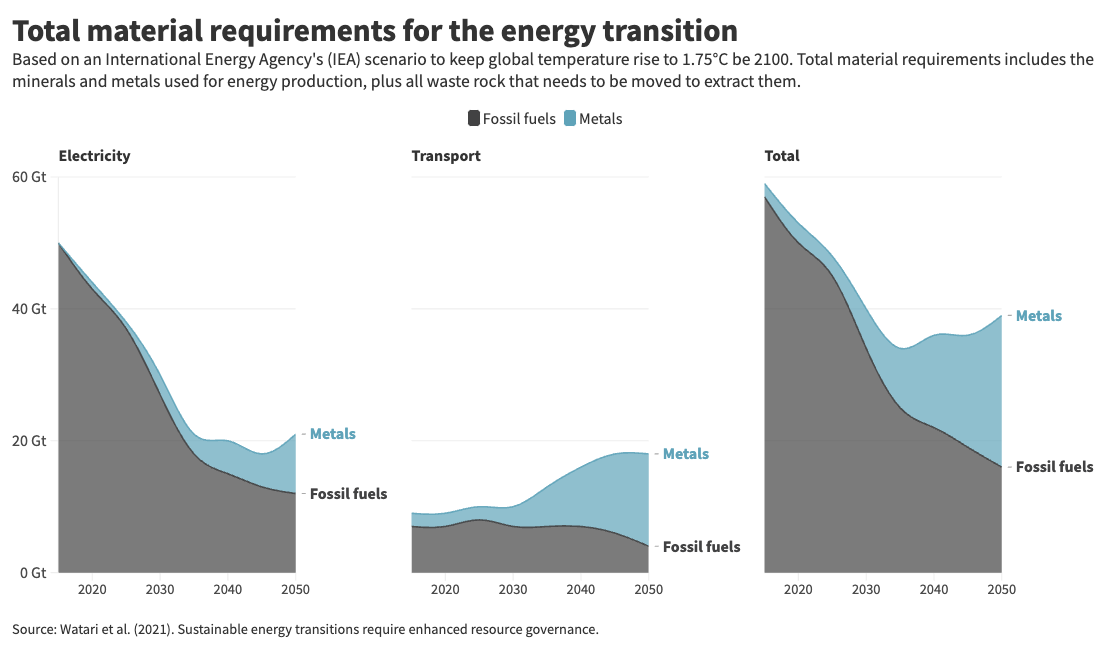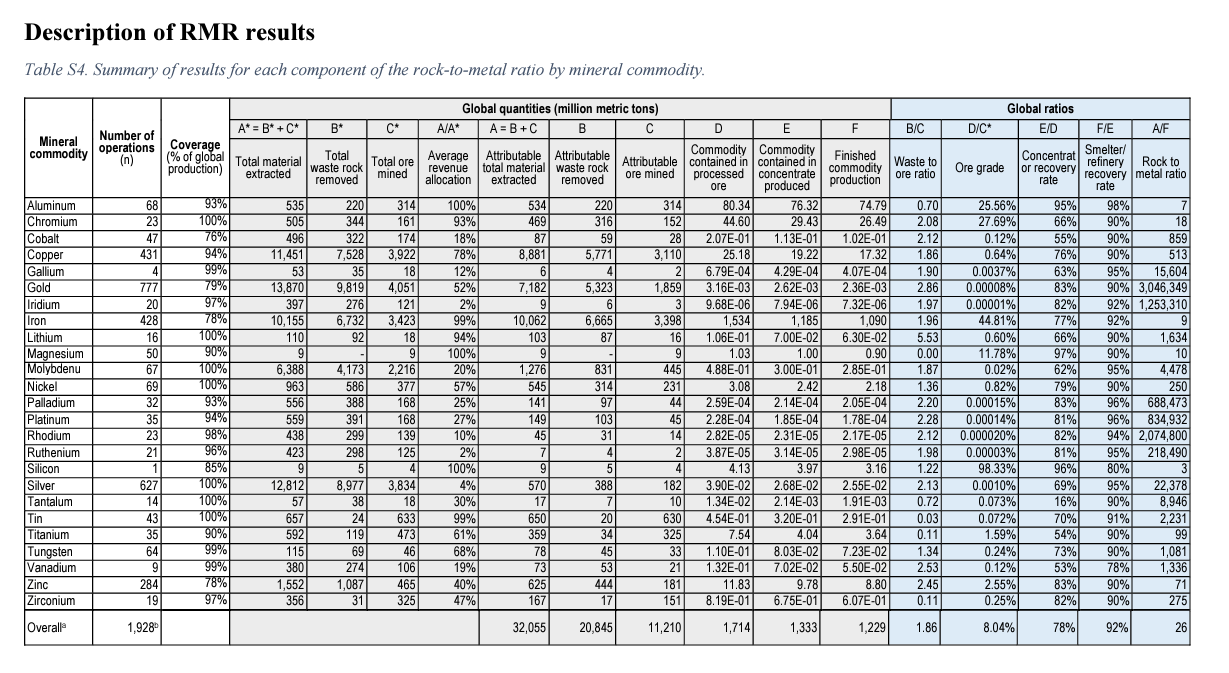The low-carbon energy transition will need less mining than fossil fuels, even when adjusted for waste rock
Low-carbon electricity will reduce material requirements, but moving to electric vehicles will increase them
Back in January, I published a post looking at the amount of minerals that were required for the low-carbon energy transition. This came from projections in the International Energy Agency (IEA)’s The Role of Critical Minerals in Clean Energy Transitions.
It projected that the world would need to produce between 27 million tonnes in its Sustainable Development Scenario, and 43 million tonnes in its Net-Zero scenario by 2040. Those scenarios did not include steel. But including them doesn’t change things significantly: we’re talking about tens to hundreds of millions of tonnes.
Sounds big, until you compare it to the 15 billion tonnes of fossil fuels that we dig out of the earth every year.
But we need to make another comparison – not only comparing the total amount of material that’s used, but the amount of ore that needs to be mined, or rock that needs to be moved. Some of these minerals are in rocks at very low concentrations – that means that to get 43 million tonnes, we’d need to extract a lot more than that.
In this post, I’ll take a look at several studies that do this adjustment.
A few key conclusions emerge:
The total quantities of rock moved for low-carbon technologies are much higher than the final amount we use. Billions, rather than tens or hundreds of millions of tonnes.
These quantities are still lower than current mining requirements for fossil fuels. In other words, the energy transition will reduce total material requirements.
The story for electricity and transport is different: material requirements for electricity will go down, but without improved recycling and more efficient material use, they’ll go up for vehicles
How do we adjust mineral requirements for total material requirements?
Researchers tend to use the term ‘total material requirements’ for the total amount of material that is moved – the minerals we finally use in our solar panels and electric cars, and the amount of waste rock that’s shifted.
The difference between these numbers – mineral use and material requirements – can be very big, because minerals are often present in rocks at very low concentrations.
There are two metrics we might want to consider here: the total amount of ore that’s mined. And the amount of material that’s moved.
The Energy Transitions Commission (ETC) shows this graphic in their Material and Resource Requirements for the Energy Transition report.
It shows how much ore is mined, or material moved to get one kilogram of a given commodity. To get one kilogram of copper, 160 kilograms of ore needs to be mined, and 510 kilograms of rock needs to be moved. This checks out because the concentration of copper in ores is around 0.6%.1
As you can see, the differences are very big.
Another example of this adjustment is shown in a recent paper by Nijnens et al. (2023).
Ore extraction for solar and wind is 9 to 13 times higher than mineral requirement. For batteries in electric cars, it’s 56 times higher.
Material requirements for low-carbon technologies will increase substantially, but they will still be lower than fossil fuel extraction
Let’s look at a few studies that have quantified the mining requirements for the energy transition.
First, we’ll start with a recent paper by Joey Nijnens and colleagues.2 It looks at the total ore extraction needed in the International Energy Agency’s Net Zero Scenario to 2050. This results in a very fast deployment of solar, wind, electric vehicles, and other low-carbon technologies. In this sense, it’s possibly the most ambitious and mineral-hungry scenario we could expect.
It compares this to coal extraction.3
Note that this looks at the amount of ore that is extracted, not waste rock. However, as we’ll see later, including this doesn’t change the overall message.
The results are shown in the chart.
The energy transition significantly reduces mining requirements. The amount needed for electricity production – as shown by solar and wind – drops a lot.
The amount of materials needed for electric vehicles is substantial, and as we’ll see later, will outstrip the reduced demand for oil.
As you can see on the right, improving recycling methods would reduce this demand even more.
You’ll notice that oil and gas are not included here – if they were, the gap between fossil fuel demand and low-carbon mineral demand would be even higher.
The energy transition will need a lot more than just solar, wind, and vehicle batteries. What about the build-out of the grid network, hydrogen, electrolysers, grid storage, nuclear, and other technologies?
The authors also estimated these based on the IEA’s Net Zero Scenario. You can see their results for 2040 in the chart below (I couldn’t find any estimates out to 2050).
Even when these are included, total ore extraction declines through decarbonisation.
Here’s another paper by Takuma Watari and colleagues.4 It looks at the total material requirements of the electricity and transport system in the International Energy Agency’s scenario to limit warming to 1.75°C by 2100 – “well below 2°C”.
This study not only looks at ore extraction but also the amount of waste rock. That can have a big impact on some materials, such as coal, where there is a large ‘overburden’ of rock that has to be moved.
The results are shown in the chart.
Again, total material requirements fall significantly. Metal demand obviously increases a lot, but this is not enough to offset the decline from fossil fuels.
However, the transition for electricity and transport is quite different. Decarbonising electricity reduces total materials, whilst transport increases it. The amount of materials that are moved per vehicle is higher for electric cars than for petrol ones.
This group of researchers published a similar analysis in 2019 and found the same results: total material requirements went down with the energy transition, but increased for transport alone.5
This study also took account of the fact that we might expect a reduction in ore concentrations of minerals as we use up the ‘best’ resources first.
Finally, the Energy Transitions Commission (ETC) estimated the amount of waste rock generated in 2050: 13 billion tonnes. They point out that this is already less than the 15 billion tonnes of fossil fuels we extract each year, before accounting for rock overburden.
Low-carbon technology deployments are periodic scale-ups compared to the continued extraction of fossil fuels
We extract around 13 billion tonnes of coal, oil, and gas every year. Without an energy transition, this will only increase in the future. And this has to happen every single year.
The time factor for low-carbon technologies is not the same. We need an initial massive scale-up – then only a periodic rebuild of them as the stocks of these technologies reach the end of their life. How large the new material requirements are will depend on how much can be recycled. A future is possible where the amount of new materials needed each year is relatively low. This won’t be for many decades, but could be feasible in the medium to long-term.
Reducing the material intensity of the energy transition should still be a priority
Fears that the energy transition will lead to a massive global expansion of mining is not backed by the data. There will be dramatic increases in the mining required for some minerals, but the total amount of material extracted is likely to shrink, not expand.
But this doesn’t mean this is a ‘solved problem’. The quantity of material is not all that matters. Where and how it is extracted is critical.
As Watari et al. (2021) point out: we will likely see a shift in material extraction towards countries with poorer governance. We need to make sure that they are extracted in an environmentally- and socially-responsible way [see my earlier article on cobalt mining in the DRC].
One part of this is minimising the amount of material we need to extract. We can do this through innovations that reduce the material intensity of batteries, improve recycling, and reduce demand (especially for vehicles through car sharing).
Watari et al. (2021) show that we could reduce mineral demand a lot by combining these approaches. For vehicles, requirements could more than halve.
Some supplementary points
A couple of points or queries that you might have on the studies above.
Researchers did not assume any improvements in the material intensity of low-carbon technologies i.e. they did not assume that the amount of minerals needed for solar panels, turbines, or car batteries went down through innovation. This is appropriate, to give us a conservative estimate of future demand. However, we should then probably take this as an upper bound: it’s unlikely that there will be no improvements in material efficiency.
Nijnens et al. (2023) tested the sensitivity of declining ore grades i.e. what would happen if we had to use ‘poorer’ resources where minerals were present at even lower concentrations. Obviously, this would increase the total material requirements of the energy transition a bit, but the conclusion remains the same: total requirements would fall through decarbonisation.
One of the most cited sources on the ratios of metal-to-ore and metal-to-rock extraction is Nassar et al. (2022).
https://pubs.acs.org/doi/10.1021/acs.est.1c07875
You can find a list of these ratios in the table below.
Nijnens, J., Behrens, P., Kraan, O., Sprecher, B., & Kleijn, R. (2023). Energy transition will require substantially less mining than the current fossil system. Joule.
Here the 'run-of-mine' extraction is used for coal: that's the raw amount of coal extracted before processing.
Watari, T., Nansai, K., Nakajima, K., & Giurco, D. (2021). Sustainable energy transitions require enhanced resource governance. Journal of Cleaner Production, 312, 127698.
Watari, T., McLellan, B. C., Giurco, D., Dominish, E., Yamasue, E., & Nansai, K. (2019). Total material requirement for the global energy transition to 2050: A focus on transport and electricity. Resources, Conservation and Recycling, 148, 91-103.










I wonder about something else: all mining is done with fossil fuels. All regenerative energy is helped by fossil fuels, for instance for building, maintaining, transport, which is done with cars, trains etc. None of these are yet electric and so on. So it's not either, but both in any case.
Also: don't forget Jevons Paradox: the more efficiently we do something, the more we do it. Instead of doing it less to achieve at the same output, we do even more and have even more output. So since we started to move into "regenerative energy" we have INCREASED our consumption of fossil energy as well.
Also, what about EROI ( ➜ energy return on (energy) invested): in mining for whatever, we get less and less back because the deposits are harder to come by. If we fall under certain EROI aggregate sum for our society energy needs, we'll not be able to maintain our current level of consuming, as being said in "How everything can collapse" by Savigny/Stevens.
There is no point around us, individually and as a society, starting to decrease our (energy) consumption. I see no sign of that, not even a discussion beginning.
Is oil and gas extraction a legitimate comparison with ore extraction? While the total material requirements go down, with oil and gas there is a far lower geological 'disruption' than with mining extraction. I am making the assumption that once oil and gas is extracted, the remaining geological 'voids' have no significant detrimental impacts - and in reality isn't it the geological impact that needs to be measured, rather than the total material requirements? Obviously coal is different, but does the conclusion that low-carbon electricity will reduce material requirements still stand up if we remove oil and gas from the calculation?